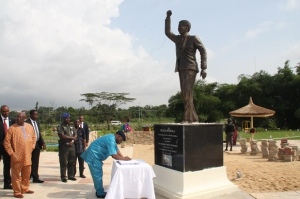

Delta State Goveronor, Dr. Emmanuel Uduaghan has joined other world leaders in reacting to the death of former South African President, Nelson Mandela, as he also urged world leaders to engage in actions that will only encourage peaceful coexistence.
The Governor, who was in a very pensive mood, on Friday, December 06, 2013, led members of the state Executive Council to “Mandela Garden Of 95 Trees”, Asaba to sign a condolence register that was opened in honour of the late Africa-born, world acclaimed peace maker.
He described the Late Nelson Mandela as a great leader who believed in peaceful co-existence, perseverance, tolerance and non-violent struggle.
“Despite the fact that Mandela spent 27 years in prison, he forgave those who imprisoned him and unified the whole of South-Africa regardless of race or colour. Today, South Africa is a peaceful nation without racial discrimination.”
Dr. Uduaghan charged world leaders to emulate the late Nelson Mandela and engage in peaceful actions stating that no leader should look down on others rather they should treat their fellow citizens with respect and dignity and see themselves as rendering service to humanity.
While noting that Mandela “was the greatest African that ever lived and one of the greatest men in the world,” Dr Uduaghan observed “that Mandela showed tolerance and continued to preach peace, he ensured that we have a more developed South Africa, his family should be very proud of him,” adding that it was a thing of joy and a consolation that Delta State had a link with him through the Mandela Garden Of 95 Trees, which was commissioned by members of his family before his death. He promised that the state would continue to uphold the Mandiba ideals.
The governor used the occasion to call on youths to emulate theperseverance and peaceful life of Mandela who started his struggle as a youth, asserting that youths should be peaceful in their approach to issues.
“Mandela did not start his struggle at old age, the youths must emulate him and carry out their activities peacefully,” the Governor said.
In the condolence register, the Governor wrote, “we celebrate the life of President Nelson Mandela, his death has brought peace which he fought for all through his life. We pray that the world will be a more peaceful place. Delta State mourn a great leader.”
To the Commissioner for Health in Delta State, Dr Joseph Otumara, Mandela “lived a fulfilled life. Blessed is the one that fulfilled the business of his life, then death is a fulfilled one. This is your case. May God grant your spirit a perfect rest.”
Earlier in a sermon at a brief memorial service at the Garden, the Chaplain of Government House Chaplaincy, Revd. Ben Golley urged the living to be guided in their actions by how such actions impact on others, asking, “what will you leave behind? When will you begin to release positive things into people’s lives? We should pray to God to teach us how to number our days”.
Prayers were offered for the soul and families of Mandela during the service.
The former South African President Nelson Mandela died peacefully at his Johannesburg home on Thursday, December 5, after a prolonged lung infection.
Mandela, the country’s first black president and anti-apartheid icon, would receive a full state funeral, President Jacob Zuma said, ordering flags to be flown at half mast.
“Fellow South Africans, our beloved Nelson Rohlihla Mandela, the founding president of our democratic nation, has departed. … Our people have lost a father. Although we knew this day was going to come, nothing can diminish our sense of a profound and enduring loss. His tireless struggle for freedom earned him the respect of the world. His humility, passion and humanity, earned him their love,” Zuma said.
Mandela spent nearly three months in the hospital through September, initially to treat a lung infection.
Nelson Mandela led South Africa’s transition from white-minority rule in the 1990s, after 27 years in prison. He negotiated with the nation’s white leaders toward establishing democracy and was elected South Africa’s first black president in 1994. He stepped down after five years in office.
He was awarded the Nobel Peace Prize in 1993.
As president, Mandela faced the monumental task of forging a new nation from the deep racial injustices left over from the apartheid era, making reconciliation the theme of his time in office.
The hallmark of Mandela’s mission was the Truth and Reconciliation Commission which probed apartheid crimes on both sides of the struggle and tried to heal the country’s wounds. It also provided a model for other countries torn by civil strife.
“During my lifetime I have dedicated myself to this struggle of the African people. I have fought against white domination, and I have fought against black domination,” he used to say.
In retirement, he shifted his energies to battling South Africa’s AIDS crisis and the struggle became personal when he lost his only surviving son to the disease in 2005.
Mandela’s last major appearance on the global stage came in 2010 when he attended the championship match of the soccer World Cup, where he received a thunderous ovation from the 90,000 at the stadium in Soweto.
Nelson Mandela’s key dates
1918 Born in the Eastern Cape
1956 Charged with high treason, but charges dropped after a four-year trial
1962 Arrested, convicted of incitement and leaving country without a passport, sentenced to five years in prison
1964 Charged with sabotage, sentenced to life
1990 Freed from prison
1993 Wins Nobel Peace Prize
1994 Elected first black president
1999 Steps down as leader
2001 Diagnosed with prostate cancer
2004 Retires from public life
2005 Announces his son has died of an HIV/Aids-related illness












